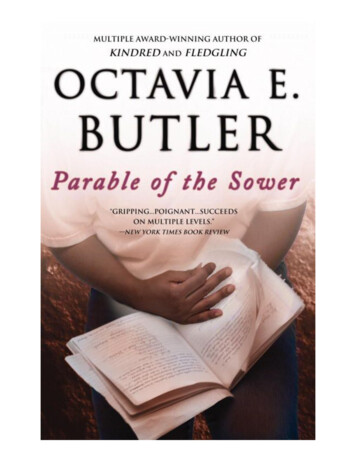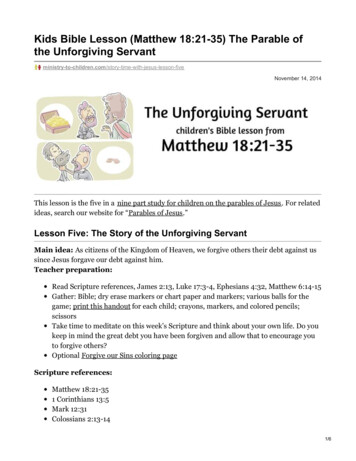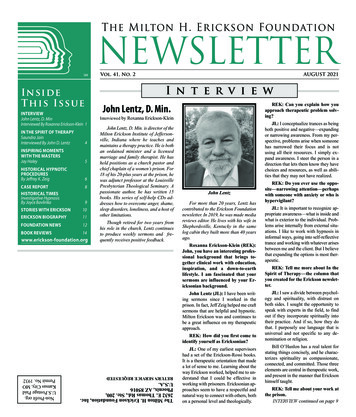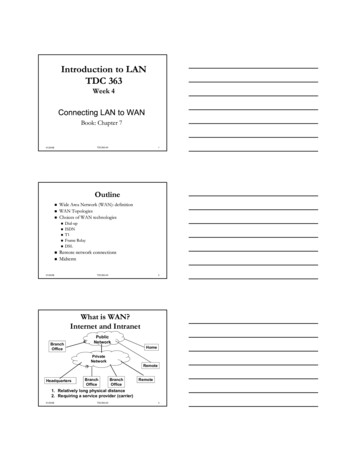
Transcription
The Works of Octavia E. ButlerParable of the Talents*Parable of the Sower*Dawn*Adulthood Rites*Imago*Wild Seed*Mind of My Mind*Clayʼs Ark*Patternmaster*KindredSurvivorBloodchild and Other Stories* Available from Warner AspectThis book is a work of fiction. Names, characters, places, and incidents are the product of the authorʼsimagination or are used fictitiously. Any resemblance to actual events, locales, or persons, living or dead, iscoincidental.Copyright 1993 by Octavia E. ButlerReading Group Guide copyright 2000 by Octavia E. Butler and Warner Books.All rights reserved.This Warner Books Edition is published by arrangement with Seven Stories Press, New York, NYAspect name and logo are registered trademarks of Warner Books.Time Warner Book Group1271 Avenue of the Americas, New York, NY 10020Visit our Web site at www.twbookmark.com.Printed in the United States of AmericaFirst Trade Printing: January 200010 9 8 7 6 5Library of Congress Cataloging-in-Publication DataButler, Octavia E.Parable of the sower / Octavia E. Butler.—Warner Books ed.p. cm.Sequel: Parable of the talents.“Aspect.”ISBN 0-446-67550-41. Afro-Americans—California, Southern—Fiction. 2. Twenty-first century—Fiction. 3. California, Southern—Fiction. I. Title.PS3552.U827 P37 2000813'. 54-dc2199-046567CIPCover design by Don PuckeyCover illustration by John BlackfordInterior design by Charles SutherlandContents202412320254
567892026101112132027141516171819202122232425A Conversation with Octavia E. Butler2024!!!PRODIGY IS, AT ITS essence, adaptability and persistent, positive obsession. Without persistence, whatremains is an enthusiasm of the moment. Without adaptability, what remains may be channeled intodestructive fanaticism. Without positive obsession, there is nothing at all.EARTHSEED: THE BOOKS OF THE LIVINGby Lauren Oya Olamina1!!!All that you touch
You Change.All that you ChangeChanges you.The only lasting truthIs Change.GodIs Change.EARTHSEED: THE BOOKS OF THE LIVINGSATURDAY, JULY 20, 2024I HAD MY RECURRING dream last night. I guess I should have expected it. It comes to me when Istruggle—when I twist on my own personal hook and try to pretend that nothing unusual is happening. It comesto me when I try to be my fatherʼs daughter.Today is our birthday—my fifteenth and my fatherʼs fifty-fifth. Tomorrow, Iʼll try to please him—him and thecommunity and God. So last night, I dreamed a reminder that itʼs all a lie. I think I need to write about the dreambecause this particular lie bothers me so much.Iʼm learning to fly, to levitate myself. No one is teaching me. Iʼm just learning on my own, little by little,dream lesson by dream lesson. Not a very subtle image, but a persistent one. Iʼve had many lessons, and Iʼmbetter at flying than I used to be. I trust my ability more now, but Iʼm still afraid. I canʼt quite control my directionsyet.I lean forward toward the doorway. Itʼs a doorway like the one between my room and the hall. It seems tobe a long way from me, but I lean toward it. Holding my body stiff and tense, I let go of whatever Iʼm grasping,whatever has kept me from rising or falling so far. And I lean into the air, straining upward, not moving upward,but not quite falling down either. Then I do begin to move, as though to slide on the air drifting a few feet abovethe floor, caught between terror and joy.I drift toward the doorway. Cool, pale light glows from it. Then I slide a little to the right; and a little more. Ican see that Iʼm going to miss the door and hit the wall beside it, but I canʼt stop or turn. I drift away from thedoor, away from the cool glow into another light.The wall before me is burning. Fire has sprung from nowhere, has eaten in through the wall, has begun toreach toward me, reach for me. The fire spreads. I drift into it. It blazes up around me. I thrash and scramble andtry to swim back out of it, grabbing handfuls of air and fire, kicking, burning! Darkness.Perhaps I awake a little. I do sometimes when the fire swallows me. Thatʼs bad. When I wake up all theway, I canʼt get back to sleep. I try, but Iʼve never been able to.This time I donʼt wake up all the way. I fade into the second part of the dream—the part thatʼs ordinary andreal, the part that did happen years ago when I was little, though at the time it didnʼt seem to matter.Darkness.Darkness brightening.Stars.Stars casting their cool, pale, glinting light.“We couldnʼt see so many stars when I was little,” my stepmother says to me. She speaks in Spanish, herown first language. She stands still and small, looking up at the broad sweep of the Milky Way. She and I havegone out after dark to take the washing down from the clothesline. The day has been hot, as usual, and weboth like the cool darkness of early night. Thereʼs no moon, but we can see very well. The sky is full of stars.The neighborhood wall is a massive, looming presence nearby. I see it as a crouching animal, perhapsabout to spring, more threatening than protective. But my stepmother is there, and she isnʼt afraid. I stay closeto her. Iʼm seven years old.I look up at the stars and the deep, black sky. “Why couldnʼt you see the stars?” I ask her. “Everyone cansee them.” I speak in Spanish, too, as sheʼs taught me. Itʼs an intimacy somehow.“City lights,” she says. “Lights, progress, growth, all those things weʼre too hot and too poor to bother withanymore.” She pauses. “When I was your age, my mother told me that the stars—the few stars we could see—were windows into heaven. Windows for God to look through to keep an eye on us. I believed her for almost ayear.” My stepmother hands me an armload of my youngest brotherʼs diapers. I take them, walk back towardthe house where she has left her big wicker laundry basket, and pile the diapers atop the rest of the clothes.The basket is full. I look to see that my stepmother is not watching me, then let myself fall backward onto the softmound of stiff, clean clothes. For a moment, the fall is like floating.I lie there, looking up at the stars. I pick out some of the constellations and name the stars that make them
up. Iʼve learned them from an astronomy book that belonged to my fatherʼs mother.I see the sudden light streak of a meteor flashing westward across the sky. I stare after it, hoping to seeanother. Then my stepmother calls me and I go back to her.“There are city lights now,” I say to her. “They donʼt hide the stars.”She shakes her head. “There arenʼt anywhere near as many as there were. Kids today have no idea whata blaze of light cities used to be—and not that long ago.”“Iʼd rather have the stars,” I say.“The stars are free.” She shrugs. “Iʼd rather have the city lights back myself, the sooner the better. But wecan afford the stars.”2!!!A gift of GodMay sear unready fingers.EARTHSEED: THE BOOKS OF THE LIVINGSUNDAY, JULY 21, 2024AT LEAST THREE YEARS ago, my fathers God stopped being my God. His church stopped being mychurch. And yet, today, because Iʼm a coward, I let myself be initiated into that church. I let my father baptize mein all three names of that God who isnʼt mine any more.My God has another name.We got up early this morning because we had to go across town to church. Most Sundays, Dad holdschurch services in our front rooms. Heʼs a Baptist minister, and even though not all of the people who livewithin our neighborhood walls are Baptists, those who feel the need to go to church are glad to come to us.That way they donʼt have to risk going outside where things are so dangerous and crazy. Itʼs bad enough thatsome people—my father for one—have to go out to work at least once a week. None of us goes out to schoolany more. Adults get nervous about kids going outside.But today was special. For today, my father made arrangements with another minister—a friend of his whostill had a real church building with a real baptistery.Dad once had a church just a few blocks outside our wall. He began it before there were so many walls.But after it had been slept in by the homeless, robbed, and vandalized several times, someone pouredgasoline in and around it and burned it down. Seven of the homeless people sleeping inside on that last nightburned with it.But somehow, Dadʼs friend Reverend Robinson has managed to keep his church from being destroyed.We rode our bikes to it this morning—me, two of my brothers, four other neighborhood kids who were ready tobe baptized, plus my father and some other neighborhood adults riding shotgun. All the adults were armed.Thatʼs the rule. Go out in a bunch, and go armed.The alternative was to be baptized in the bathtub at home. That would have been cheaper and safer andfine with me. I said so, but no one paid attention to me. To the adults, going outside to a real church was likestepping back into the good old days when there were churches all over the place and too many lights andgasoline was for fueling cars and trucks instead of for torching things. They never miss a chance to relive thegood old days or to tell kids how great itʼs going to be when the country gets back on its feet and good timescome back.Yeah.To us kids—most of us—the trip was just an adventure, an excuse to go outside the wall. We would bebaptized out of duty or as a kind of insurance, but most of us arenʼt that much concerned with religion. I am, butthen I have a different religion.“Why take chances,” Silvia Dunn said to me a few days ago. “Maybe thereʼs something to all this religionstuff.” Her parents thought there was, so she was with us.My brother Keith who was also with us didnʼt share any of my beliefs. He just didnʼt care. Dad wanted himto be baptized, so what the hell. There wasnʼt much that Keith did care about. He liked to hang out with hisfriends and pretend to be grown up, dodge work and dodge school and dodge church. Heʼs only twelve, theoldest of my three brothers. I donʼt like him much, but heʼs my stepmotherʼs favorite. Three smart sons and onedumb one, and itʼs the dumb one she loves best.Keith looked around more than anyone as we rode. His ambition, if you could call it that, is to get out of theneighborhood and go to Los Angeles. Heʼs never too clear about what heʼll do there. He just wants to go to thebig city and make big money. According to my father, the big city is a carcass covered with too many maggots. Ithink heʼs right, though not all the maggots are in LA. Theyʼre here, too.But maggots tend not to be early-morning types. We rode past people stretched out, sleeping on the
sidewalks, and a few just waking up, but they paid no attention to us. I saw at least three people who werenʼtgoing to wake up again, ever. One of them was headless. I caught myself looking around for the head. Afterthat, I tired not to look around at all.A woman, young, naked, and filthy stumbled along past us. I got a look at her slack expression andrealized that she was dazed or drunk or something.Maybe she had been raped so much that she was crazy. Iʼd heard stories of that happening. Or maybeshe was just high on drugs. The boys in our group almost fell off their bikes, staring at her. What wonderfulreligious thoughts they would be having for a while.The naked woman never looked at us. I glanced back after weʼd passed her and saw that she had settleddown in the weeds against someone elseʼs neighborhood wall.A lot of our ride was along one neighborhood wall after another; some a block long, some two blocks,some five Up toward the hills there were walled estates—one big house and a lot of shacky littledependencies where the servants lived. We didnʼt pass anything like that today. In fact we passed a couple ofneighborhoods so poor that their walls were made up of unmortared rocks, chunks of concrete, and trash. Thenthere were the pitiful, unwalled residential areas. A lot of the houses were trashed—burned, vandalized,infested with drunks or druggies or squatted-in by homeless families with their filthy, gaunt, half-naked children.Their kids were wide awake and watching us this morning. I feel sorry for the little ones, but the ones my ageand older make me nervous. We ride down the middle of the cracked street, and the kids come out and standalong the curb to stare at us. They just stand and stare. I think if there were only one or two of us, or if theycouldnʼt see our guns, they might try to pull us down and steal our bikes, our clothes, our shoes, whatever.Then what? Rape? Murder? We could wind up like that naked woman, stumbling along, dazed, maybe hurt,sure to attract dangerous attention unless she could steal some clothing. I wish we could have given hersomething.My stepmother says she and my father stopped to help an injured woman once, and the guys who hadinjured her jumped out from behind a wall and almost killed them.And weʼre in Robledo—20 miles from Los Angeles, and, according to Dad, once a rich, green, unwalledlittle city that he had been eager to abandon when he was a young man. Like Keith, he had wanted to escapethe dullness of Robledo for big city excitement. L.A. was better then—less lethal. He lived there for 21 years.Then in 2010, his parents were murdered and he inherited their house. Whoever killed them had robbed thehouse and smashed up the furniture, but they didnʼt torch anything. There was no neighborhood wall backthen.Crazy to live without a wall to protect you. Even in Robledo, most of the street poor—squatters, winos,junkies, homeless people in general—are dangerous. Theyʼre desperate or crazy or both. Thatʼs enough tomake anyone dangerous.Worse for me, they often have things wrong with them. They cut off each otherʼs ears, arms, legs Theycarry untreated diseases and festering wounds. They have no money to spend on water to wash with so eventhe unwounded have sores. They donʼt get enough to eat so theyʼre malnourished—or they eat bad food andpoison themselves. As I rode, I tried not to look around at them, but I couldnʼt help seeing—collecting—some oftheir general misery.I can take a lot of pain without falling apart. Iʼve had to learn to do that. But it was hard, today, to keeppeddling and keep up with the others when just about everyone I saw made me feel worse and worse.My father glanced back at me every now and then. He tells me, “You can beat this thing. You donʼt have togive in to it.” He has always pretended, or perhaps believed, that my hyperempathy syndrome was something Icould shake off and forget about. The sharing isnʼt real, after all. It isnʼt some magic or ESP that allows me toshare the pain or the pleasure of other people. Itʼs delusional. Even I admit that. My brother Keith used topretend to be hurt just to trick me into sharing his supposed pain. Once he used red ink as fake blood to makeme bleed. I was eleven then, and I still bled through the skin when I saw someone else bleeding. I couldnʼt helpdoing it, and I always worried that it would give me away to people outside the family.I havenʼt shared bleeding with anyone since I was twelve and got my first period. What a relief that was. Ijust wish all the rest of it had gone away, too. Keith only tricked me into bleeding that once, and I beat the hellout of him for it. I didnʼt fight much when I was little because it hurt me so. I felt every blow that I struck, just asthough Iʼd hit myself. So when I did decide that I had to fight, I set out to hurt the other kid more than kids usuallyhurt one another. I broke Michael Talcottʼs arm and Rubin Quintanillaʼs nose. I knocked out four of SilviaDunnʼs teeth. They all earned what I did to them two or three times over. I got punished every time, and Iresented it. It was double punishment, after all, and my father and stepmother knew it. But knowing didnʼt stopthem. I think they did it to satisfy the other kidsʼ parents. But when I beat up Keith, I knew that Cory or Dad orboth of them would punish me for it—my poor little brother, after all. So I had to see that my poor little brotherpaid in advance. What I did to him had to be worthwhile in spite of what they would do to me.It was.We both got it later from Dad—me for hurting a younger kid and Keith for risking putting “family business”into the street. Dad is big on privacy and “family business.” Thereʼs a whole range of things we never even hintabout outside the family. First among these is anything about my mother, my hyperempathy, and how the twoare connected. To my father, the whole business is shameful. Heʼs a preacher and a professor and a dean. Afirst wife who was a drug addict and a daughter who is drug damaged is not something he wants to boastabout. Lucky for me. Being the most vulnerable person I know is damned sure not something I want to boast
about.I canʼt do a thing about my hyperempathy, no matter what Dad thinks or wants or wishes. I feel what I seeothers feeling or what I believe they feel. Hyperempathy is what the doctors call an “organic delusionalsyndrome.” Big shit. It hurts, thatʼs all I know. Thanks to Paracetco, the small pill, the Einstein powder, theparticular drug my mother chose to abuse before my birth killed her, Iʼm crazy. I get a lot of grief that doesnʼtbelong to me, and that isnʼt real. But it hurts.Iʼm supposed to share pleasure and pain, but there isnʼt much pleasure around these days. About theonly pleasure Iʼve found that I enjoy sharing is sex. I get the guyʼs good feeling and my own. I almost wish Ididnʼt. I live in a tiny, walled fish-bowl cul-de-sac community, and Iʼm the preacherʼs daughter. Thereʼs a reallimit to what I can do as far as sex goes.Anyway, my neurotransmitters are scrambled and theyʼre going to stay scrambled. But I can do okay aslong as other people donʼt know about me. Inside our neighborhood walls I do fine. Our rides today, though,were hell. Going and coming, they were all the worst things Iʼve ever felt—shadows and ghosts, twists and jabsof unexpected pain.If I donʼt look too long at old injuries, they donʼt hurt me too much. There was a naked little boy whose skinwas a mass of big red sores; a man with a huge scab over the stump where his right hand used to be; a littlegirl, naked, maybe seven years old with blood running down her bare thighs. A woman with a swollen, bloody,beaten face I must have seemed jumpy. I glanced around like a bird, not letting my gaze rest on anyone longer than ittook me to see that they werenʼt coming in my direction or aiming anything at me.Dad may have read something of what I was feeling in my expression. I try not to let my face showanything, but heʼs good at reading me. Sometimes people say I look grim or angry. Better to have them thinkthat than know the truth. Better to have them think anything than let them know just how easy it is to hurt me.Dad had insisted on fresh, clean, potable water for the baptism. He couldnʼt afford it, of course. Whocould? That was the other reason for the four extra kids:Silvia Dunn, Hector Quintanilla, Curtis Talcott, and Drew Baiter, along with my brothers Keith and Marcus.The other kidsʼ parents had helped with costs. They thought a proper baptism was important enough to spendsome money and take some risks. I was the oldest by about two months. Curtis was next. As much as I hatedbeing there, I hated even more that Curtis was there. I care about him more than I want to. I care what he thinksof me. I worry that Iʼll fall apart in public some day and heʼll see. But not today.By the time we reached the fortress-church, my jaw-muscles hurt from clinching and unclinching my teeth,and overall, I was exhausted.There were only five or six dozen people at the service—enough to fill up our front rooms at home andlook like a big crowd. At the church, though, with its surrounding wall and its security bars and Lazor wire andits huge hollowness inside, and itʼs armed guards, the crowd seemed a tiny scattering of people. That was allright. The last thing I wanted was a big audience to maybe trip me up with pain.The baptism went just as planned. They sent us kids off to the bathrooms (“menʼs,” “womenʼs,” “please donot put paper of any kind into toilets,” “water for washing in bucket at left ”) to undress and put on whitegowns. When we were ready, Curtisʼs father took us to an anteroom where we could hear the preaching—fromthe first chapter of Saint John and the second chapter of The Acts—and wait our turns.My turn came last. I assume that was my fatherʼs idea. First the neighbor kids, then my brothers, then me.For reasons that donʼt make a lot of sense to me, Dad thinks I need more humility. I think my particularbiological humility—or humiliation—is more than enough.What the hell? Someone had to be last. I just wish I could have been courageous enough to skip the thingaltogether.So, “In the name of the Father, the Son, and the Holy Ghost ”Catholics get this stuff over with when theyʼre babies. I wish Baptists did. I almost wish I could believe itwas important the way a lot of people seem to, the way my father seems to. Failing that, I wish I didnʼt care.But I do. The idea of God is much on my mind these days. Iʼve been paying attention to what other peoplebelieve—whether they believe, and if so what kind of God they believe in. Keith says God is just the adultsʼ wayof trying to scare you into doing what they want. He doesnʼt say that around Dad, but he says it. He believes inwhat he sees, and no matter whatʼs in front of him, he doesnʼt see much. I suppose Dad would say that aboutme if he knew what I believe. Maybe heʼd be right. But it wouldnʼt stop me from seeing what I see.A lot of people seem to believe in a big-daddy-God or a big-cop-God or a big-king-God. They believe in akind of super-person. A few believe God is another word for nature. And nature turns out to mean just aboutanything they happen not to understand or feel in control of.Some say God is a spirit, a force, an ultimate reality. Ask seven people what all of that means and youʼllget seven different answers. So what is God? Just another name for whatever makes you feel special andprotected?Thereʼs a big, early-season storm blowing itself out in the Gulf of Mexico. Itʼs bounced around the Gulf,killing people from Florida to Texas and down into Mexico. There are over 700 known dead so far. Onehurricane. And how many people has it hurt? How many are going to starve later because of destroyed crops?Thatʼs nature. Is it God? Most of the dead are the street poor who have nowhere to go and who donʼt hear thewarnings until itʼs too late for their feet to take them to safety. Whereʼs safety for them anyway? Is it a sin againstGod to be poor? Weʼre almost poor ourselves. There are fewer and fewer jobs among us, more of us being
born, more kids growing up with nothing to look forward to. One way or another, weʼll all be poor some day.The adults say things will get better, but they never have. How will God—my fatherʼs God—behave toward uswhen weʼre poor?Is there a God? If there is, does he (she? it?) care about us? Deists like Benjamin Franklin and ThomasJefferson believed God was something that made us, then left us on our own.“Misguided,” Dad said when I asked him about Deists. “They should have had more faith in what theirBibles told them.”I wonder if the people on the Gulf Coast still have faith. People have had faith through horrible disastersbefore. I read a lot about that kind of thing. I read a lot period. My favorite book of the Bible is Job. I think it saysmore about my fatherʼs God in particular and gods in general than anything else Iʼve ever read.In the book of Job, God says he made everything and he knows everything so no one has any right toquestion what he does with any of it. Okay. That works. That Old Testament God doesnʼt violate the way thingsare now. But that God sounds a lot like Zeus—a super-powerful man, playing with his toys the way myyoungest brothers play with toy soldiers. Bang, bang! Seven toys fall dead. If theyʼre yours, you make the rules.Who cares what the toys think. Wipe out a toyʼs family, then give it a brand new family. Toy children, like Jobʼschildren, are interchangeable.Maybe God is a kind of big kid, playing with his toys. If he is, what difference does it make if 700 peopleget killed in a hurricane—or if seven kids go to church and get dipped in a big tank of expensive water?But what if all that is wrong? What if God is something else altogether?3!!!We do not worship God.We perceive and attend God.We learn from God.With forethought and work,We shape God.In the end, we yield to God.We adapt and endure,For we are EarthseedAnd God is Change.EARTHSEED: THE BOOKS OF THE LIVINGTUESDAY, JULY 30, 2024ONE OF THE ASTRONAUTS on the latest Mars mission has been killed. Something went wrong with herprotective suit and the rest of her team couldnʼt get her back to the shelter in time to save her. People here inthe neighborhood are saying she had no business going to Mars, anyway. All that money wasted on anothercrazy space trip when so many people here on earth canʼt afford water, food, or shelter.The cost of water has gone up again. And I heard on the news today that more water peddlers are beingkilled. Peddlers sell water to squatters and the street poor—and to people whoʼve managed to hold on to theirhomes, but not to pay their utility bills. Peddlers are being found with their throats cut and their money and theirhandtrucks stolen. Dad says water now costs several times as much as gasoline. But, except for arsonists andthe rich, most people have given up buying gasoline. No one I know uses a gas-powered car, truck, or cycle.Vehicles like that are rusting in driveways and being cannibalized for metal and plastic.Itʼs a lot harder to give up water.Fashion helps. Youʼre supposed to be dirty now. If youʼre clean, you make a target of yourself. Peoplethink youʼre showing off, trying to be better than they are. Among the younger kids, being clean is a great wayto start a fight. Cory wonʼt let us stay dirty here in the neighborhood, but we all have filthy clothes to wearoutside the walls. Even inside, my brothers throw dirt on themselves as soon as they get away from the house.Itʼs better than getting beaten up all the time.Tonight the last big Window Wall television in the neighborhood went dark for good. We saw the deadastronaut with all of red, rocky Mars around her. We saw a dust-dry reservoir and three dead water peddlers
with their dirty-blue armbands and their heads cut halfway off. And we saw whole blocks of boarded upbuildings burning in Los Angeles. Of course, no one would waste water trying to put such fires out.Then the Window went dark. The sound had flickered up and down for months, but the picture was alwaysas promised—like looking through a vast, open window.The Yannis family has made a business of having people in to look through their Window. Dad says thatkind of unlicensed business isnʼt legal, but he let us go to watch sometimes because he didnʼt see any harm init, and it helped the Yannises. A lot of small businesses are illegal, even though they donʼt hurt anyone, andthey keep a household or two alive. The Yannis Window is about as old as I am. It covers the long west wall oftheir living room. They must have had plenty of money back when they bought it. For the past couple of years,though, theyʼve been charging admission—only letting in people from the neighborhood—and selling fruit, fruitjuice, acorn bread, or walnuts. Whatever they had too much of in their garden, they found a way to sell. Theyshowed movies from their library and let us watch news and whatever else was broadcast. They couldnʼt affordto subscribe to any of the new multisensory stuff, and their old Window couldnʼt have received most of it,anyway.They have no reality vests, no touch-rings, and no headsets. Their setup was just a plain, thin-screenedWindow.All we have left now are three small, ancient, murky little TV sets scattered around the neighborhood, acouple of computers used for work, and radios. Every household still has at least one working radio. A lot of oureveryday news is from radio.I wonder what Mrs. Yannis will do now. Her two sisters have moved in with her, and theyʼre working somaybe it will be all right. One is a pharmacist and the other is a nurse. They donʼt earn much, but Mrs. Yannisowns the house free and clear. It was her parentsʼ house.All three sisters are widows and between them they have twelve kids, all younger than I am. Two yearsago, Mr. Yannis, a dentist, was killed while riding his electric cycle home from the walled, guarded clinic wherehe worked. Mrs. Yannis says he was caught in a crossfire, hit from two directions, then shot once more at closerange. His bike was stolen. The police investigated, collected their fee, and couldnʼt find a thing. People getkilled like that all the time. Unless it happens in front of a police station, there are never any witnesses.SATURDAY, AUGUST 3, 2024The dead astronaut is going to be brought back to Earth. She wanted to be buried on Mars. She said thatwhen she realized she was dying. She said Mars was the one thing she had wanted all her life, and now shewould be part of it forever.But the Secretary of Astronautics says no. He says her body might be a contaminant. Idiot.Can he believe that any microorganism living in or on her body would have a prayer of surviving andgoing native in that cold, thin, lethal ghost of an atmosphere? Maybe he can. Secretaries of Astronautics donʼthave to know much about science. They have to know about politics. Theirs is the youngest Cabinetdepartment, and already itʼs fighting for its life. Christopher Morpeth Donner, one of the men running forPresident this year, has promised to abolish it if heʼs elected. My father agrees with Donner.“Bread and circuses,” my father says when thereʼs space news on the radio. “Politicians and bigcorporations get the bread, and we get the circuses.”“Space could be our future,” I say. I believe that. As far as Iʼm concerned, space exploration andcolonization are among the few things left over from the last century that
“The stars are free.” She shrugs. “Iʼd rather have the city lights back myself, the sooner the better. But we can afford the stars.” 2! ! ! A gift of God May sear unready fingers. EARTHSEED: THE BOOKS OF THE LIVING SUNDAY, JULY 21, 2024 AT LEAST THREE YEARS ago, my fathers God











